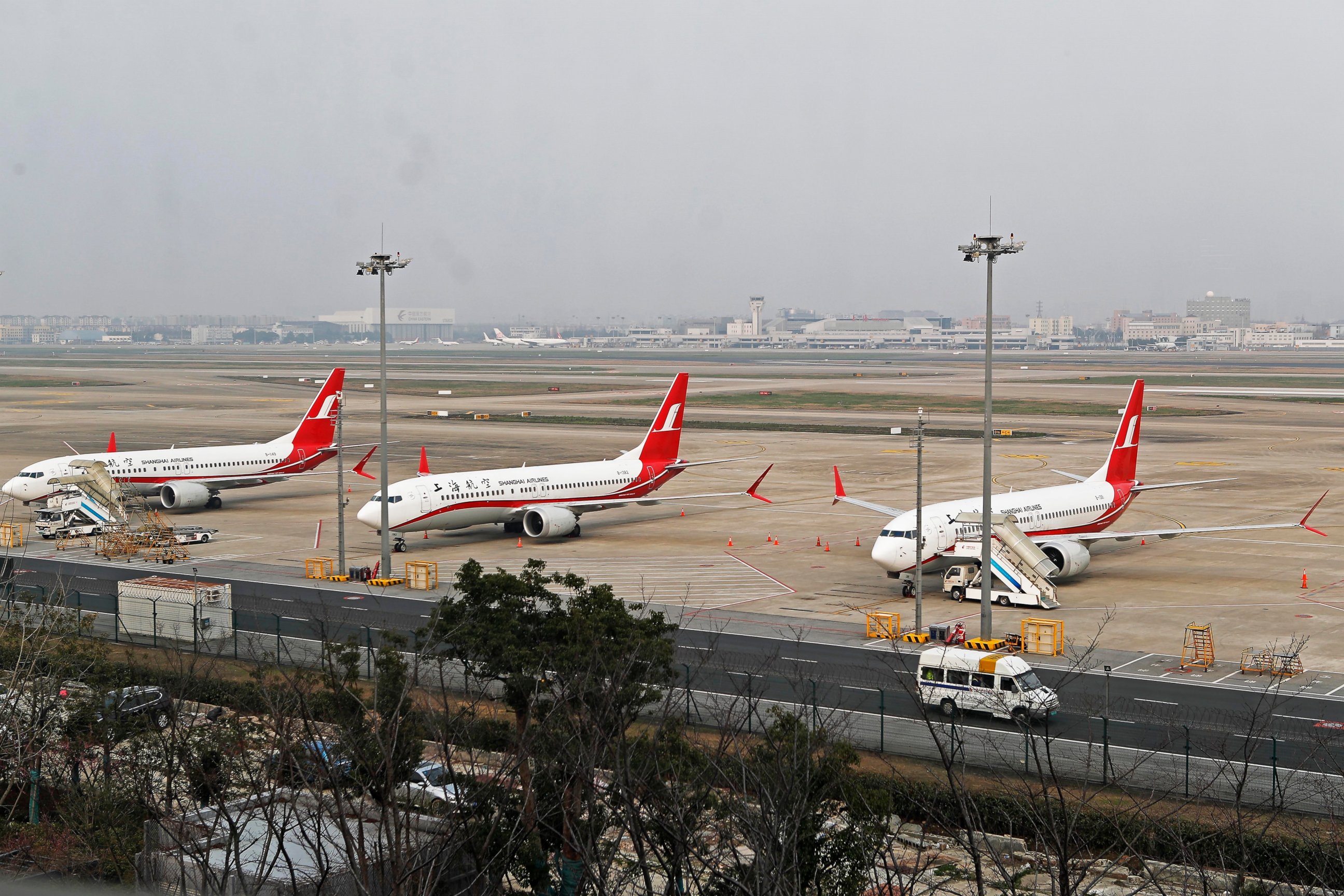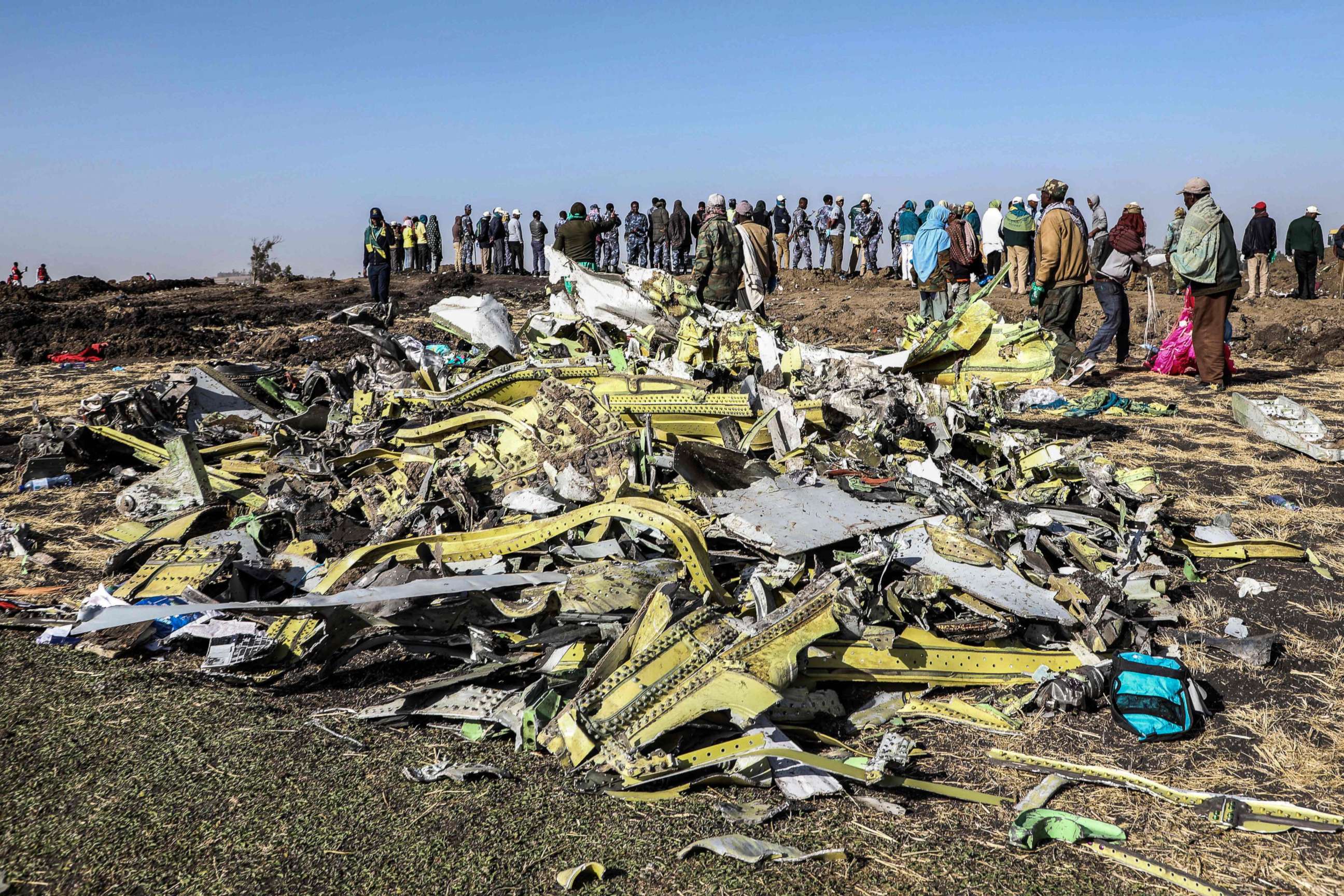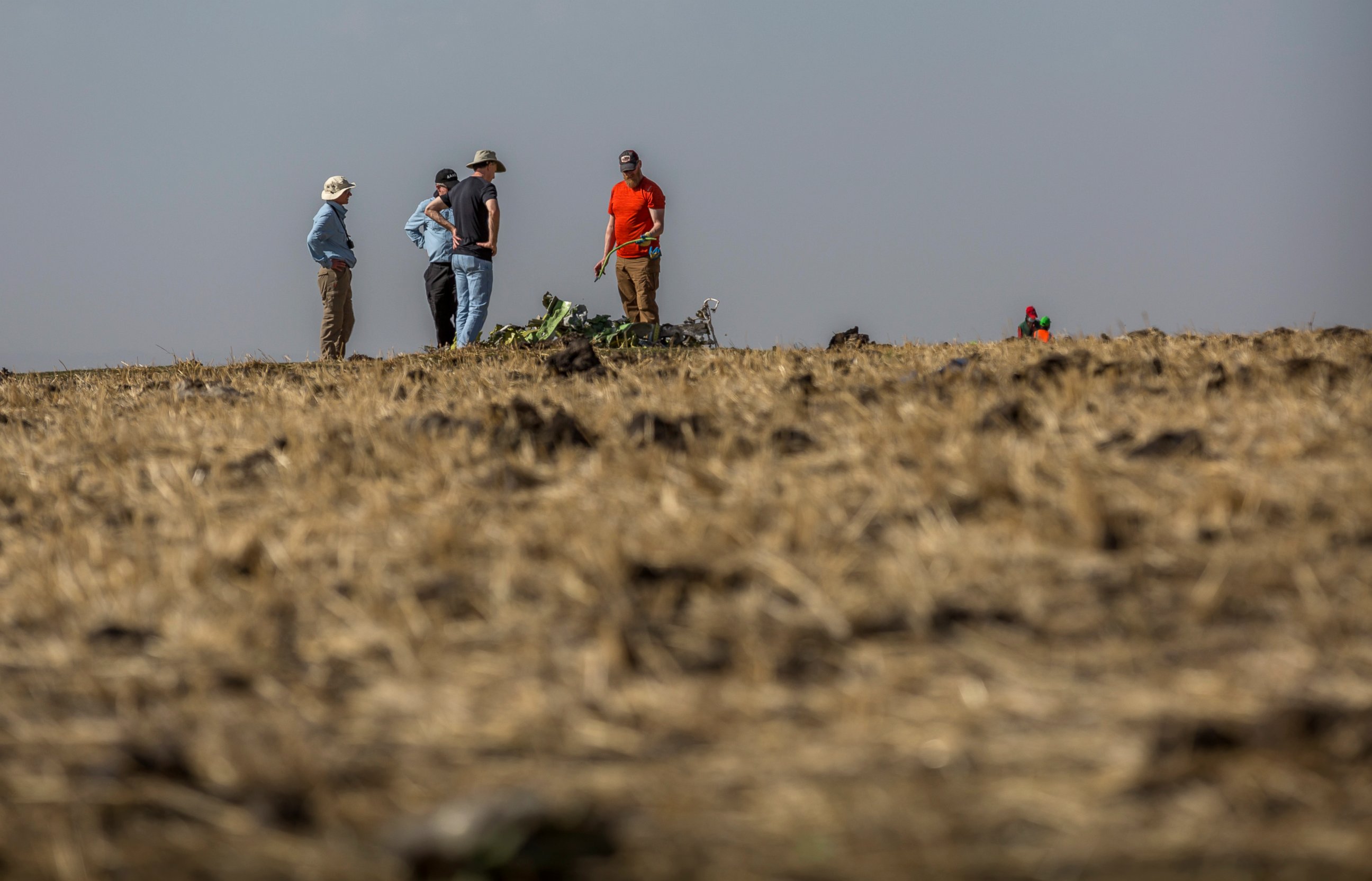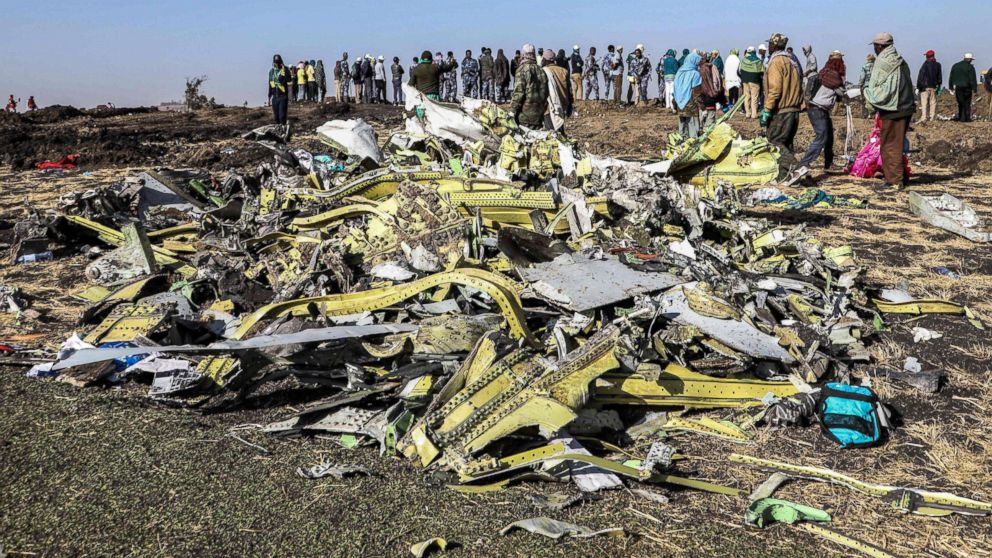Pressure mounts on FAA as more countries ground or ban the Boeing 737 MAX 8
As more countries and airlines around the world grounded the Boeing 737 MAX 8 or banned the plane from their airspace Tuesday, pressure was growing on the Federal Aviation Administration to take similar action in the United States.
Tuesday evening, acting Federal Aviation Administration Administrator Daniel Elwell said in a statement that the agency continues to extensively review all available data and aggregate safety performance information from operators and pilots, but that, "Thus far, our review shows no systemic performance issues and provides no basis to order grounding the aircraft."
Adding to that pressure was uncertainty over how -- and how soon -- critical questions might be answered about what might have caused Sunday's crash of the Ethiopian Airlines 737 MAX 8 that killed 157 people just six minutes after takeoff.
"In the course of our urgent review of data on the Ethiopian Airlines Flight 302 crash, if any issues affecting the continued air-worthiness of the aircraft are identified, the FAA will take immediate and appropriate action," Elwell's statement concluded.

It was still unclear Tuesday how Ethiopia would handle retrieval of data from the "black boxes" recovered from the wreckage -- the flight data and cockpit voice recorders -- including whether it would ask for help from the U.S. or other countries with more sophisticated labs, Ethiopia's lead investigator told ABC News.
Investigators said they would spend at least the next two to three days at the crash site before beginning the process of getting the data recorders analyzed, the country's lead investigator, Amedey Fanta, told ABC News' Chief National Correspondent Matt Gutman at the scene outside Ethiopia's capital, Addis Ababa.
The European Union Aviation Safety Agency, which often works in tandem with the FAA, announced Tuesday it was suspending all Boeing 737 MAX 8 and MAX 9 (a longer version) operations in Europe -- "taking every step necessary to ensure the safety of passengers."
Because of the uncertainty, the UK Civil Aviation Authority, announced Tuesday that it, too, was banning the 737 MAX 8 from its airspace.
"The UK Civil Aviation Authority has been closely monitoring the situation, however, as we do not currently have sufficient information from the flight data recorder we have, as a precautionary measure, issued instructions to stop any commercial passenger flights from any operator arriving, departing or overflying UK airspace," a statement said.
"The UK Civil Aviation Authority's safety directive will be in place until further notice. We remain in close contact with the European Aviation Safety Agency (EASA) and industry regulators globally," the statement continued.
A key question is whether the plane's advanced flight management system -- the autopilot -- might have played a role in the most recent crash as it did in the fatal crash of an Indonesian Airlines 737 MAX 8 last October, In that crash, it appears the pilots failed to disengage the autopilot when the plane's nose began pitching up and down, perhaps because they were unaware of how to do so.
Both planes experienced similar pitch problems right after takeoff.
President Donald Trump spoke by phone with Boeing CEO Dennis Muilenburg Tuesday, White House spokesman Judd Deere confirmed, but he released no other details other than to say "we are continuing to monitor the situation."
On Tuesday evening, Boeing confirmed the conversation to ABC News and said that Muilenburg reiterated to the president "our position that the MAX aircraft is safe."
Trump weighed in earlier Tuesday, tweeting that today's jetliners were getting dangerously complex -- that "I don't want Albert Einstein to be my pilot" -- and that pilots must be able to "easily and quickly take control of a plane."
Asked on the Fox News program "Outnumbered" why the president has not ordered the FAA to ground the aircraft, White House press secretary Sarah Sanders said, "it's early in the process."
She said the White House will be “constant contact through the Department of Transportation, the FAA, to make determinations at the appropriate time.”
In the face of the growing international pressure, Boeing put out an updated statement Tuesday.
"Safety is Boeing’s number one priority and we have full confidence in the safety of the MAX," the statement said. "We understand that regulatory agencies and customers have made decisions that they believe are most appropriate for their home markets. We’ll continue to engage with all of them to ensure they have the information they need to confidently operate their fleets or return them to service.
"It is also important to note that the Federal Aviation Administration is not mandating any further action at this time, and based on the information currently available, we do not have any basis to issue new guidance to operators," the Boeing statement said.
But while Boeing, the FAA and U.S. carriers that operate 72 of the Boeing 737 MAX 8 planes -- Southwest, American and United -- were standing by the safety of the aircraft, political pressure was rising in Washington.
Democratic Sen. Elizabeth Warren of Massachusetts, who is running for president, urged the FAA to follow the lead of other countries and "immediately ground this plane in the United States until its safety can be assured."

Because the FAA has not yet ruled one way or the other, the agency should "air on the side of protecting the flying public until you know for sure what happened," Warren said on ABC News Live's "The Briefing Room" Tuesday afternoon.
In her statement on the issue Tuesday morning, Warren also called out the Trump administration's previous attempts to protect an ongoing Boeing arms deal with Saudi Arabia by not denouncing the country's government, which was accused of murdering Washington Post journalist Jamal Khashoggi in 2018.
Pressed if she believed the FAA or Trump administration was protecting Boeing, Warren said, "That's sure what we watched last time."
"For me. I just want to be sure this is not about protecting Boeing's profits, this is about protecting the people who get on those airplanes and count on the fact that they're going to be safe," Warren said on "The Briefing Room."
“Until the cause of the crash is known and it’s clear that similar risks aren’t present in the domestic fleet, I believe all Boeing 737 Max 8 series aircraft operating in the United States should be temporarily grounded,” Sen. Dianne Feinstein, a Democrat from California, wrote in a letter to the FAA Monday.
Several countries have already taken “this important step,” Feinstein said.
Sen. Richard Blumenthal, a Democrat from Connecticut who sits on the Senate committee that oversees U.S. aviation, echoed Feinstein’s call and said he was encouraging his own family and friends to avoid the planes.
"The 737 MAX 8 should be immediately grounded until the FAA can assure us they are safe,” Blumenthal told reporters on Capitol Hill Tuesday. "I’m advising members of my own family and friends they ought to change planes, change flights, change airlines, whatever they need to do to avoid these 737 Max 8s until they are proven safe -- which right now is very much in doubt."
Blumenthal also urged all airlines to completely waive flight change fees.
Republican Sen. John Thune of South Dakota, who sits on the same Senate committee, said -- "like probably everybody else" -- he would also feel safer "flying some other airplane at the moment." Fellow Republican Sen. Mitt Romney of Utah called for the FAA to ground the aircraft "out of an abundance of caution, and frankly common sense."
House Transportation and Infrastructure Committee Chairman Peter DeFazio stopped short of asking the FAA to ground the 737 MAX 8 aircraft, but increased pressure on the FAA Tuesday, calling on its leading safety experts to "do what is necessary in a timely manner to provide certainty to the flying public that the nation's aviation system remains exceptionally safe," he said in a statement.
“I remain concerned that international aviation regulators are providing more certainty to the flying public by grounding the 737 MAX 8 than our own FAA – the world leader in aviation safety,” DeFazio, a Democrat from Oregon, said.

Meanwhile, the Association of Professional Flight Attendants, a union that represents flight attendants who work for American Airlines, directly urged the airline's CEO Doug Parker to ground the planes pending the results of the investigation and said flight attendants would not be forced to fly if they felt unsafe.
"While we cannot draw premature conclusions, it is critical to work with manufacturers, regulators and airlines to take steps to address our important safety concerns," said APFA's National President Lori Bassani in a statement calling on Parker.
The Association of Flight Attendants-CWA, which represents United employees, said crew and passengers “are expressing concern about the 737 Max 8.”
“It is vitally important that U.S. airlines work with Boeing, the FAA, and the NTSB to address concerns and take steps to ensure confidence for the traveling public and working crews," said AFA-CWA President Sara Nelson.
At least one pilot's union -- the Southwest Airlines Pilots Association -- came out in support of its airline's decision to keep flying the planes. The union is “extremely confident that our entire fleet, including the MAX, is safe based on the facts, intelligence, data and information we presently have,” the group's president, Capt. Jon Weaks, said in a statement.
About one-third of the Boeing 737 MAX 8 jets around the world were grounded as of Tuesday morning.
On Monday, Ethiopian Airlines, the flag carrier of the East African nation, grounded its remaining Boeing 737 MAX 8 aircraft "until further notice." Also on Monday, China grounded its 96 jets and Indonesia temporarily grounded its Boeing 737 MAX 8 fleet as well. The United Kingdom joined the growing list and grounded its five jets on Tuesday morning.
Singapore has indefinitely banned all Boeing 737 MAX aircraft from flying into and out of the country, as has Australia, Malaysia, Oman and Ireland, as of Tuesday afternoon. None of the countries fly the model themselves.
Airlines in other countries also have announced the grounding of Boeing 737 MAX 8 fleets, including Cayman Airways, South Africa-based airline Comair, Aeromexico, Aerolineas Argentinas, Brazil's largest airline Gol, Morocco's national carrier Royal Air Maroc and South Korean airline Eastar Jet.
Sunwing became the first Canadian airline to ground its MAX 8s, four of them, early Wednesday.
ABC News' David Kerley, Jeffrey Cook, Mariam Khan, Christine Theodorou and Matt Gutman contributed to this report.




